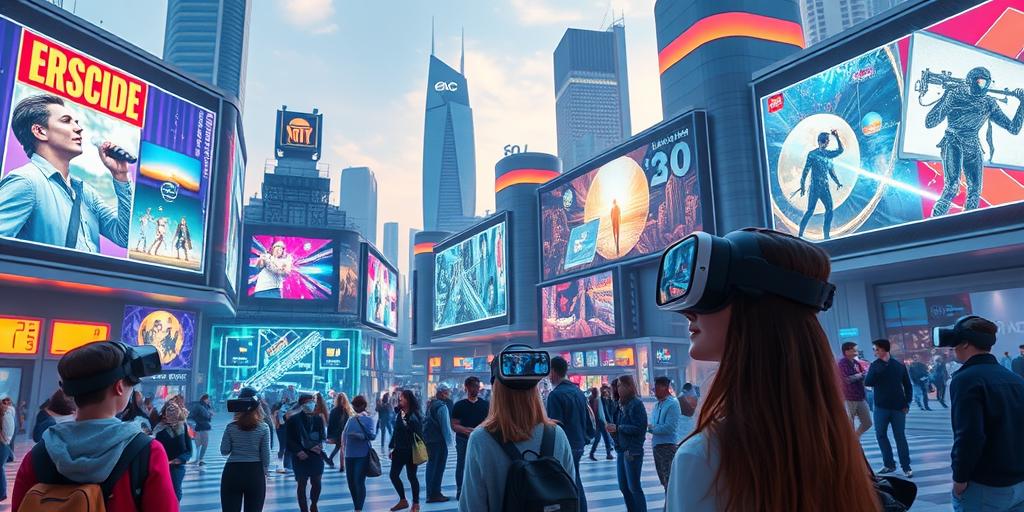The Metaverse’s Impact on Entertainment in 2025: Beyond the Hype
The metaverse, once a futuristic buzzword, is rapidly evolving into a tangible reality. By 2025, its influence on the entertainment industry is poised to extend far beyond the initial hype, fundamentally reshaping how we consume and interact with media. This article will explore the key trends and potential impacts of the metaverse on entertainment, offering a balanced perspective on the opportunities and challenges that lie ahead.
Immersive Experiences and Interactive Storytelling
One of the most significant impacts of the metaverse will be the rise of immersive experiences. Forget passively watching a movie; in the metaverse, you can step inside the story. Imagine attending a live concert where you’re not just in the audience, but on stage with your favorite artist, or participating in an interactive drama where your choices directly influence the narrative. These experiences will leverage virtual reality (VR), augmented reality (AR), and mixed reality (MR) technologies to create a sense of presence and agency that traditional media cannot replicate.
- Virtual Concerts: Artists can perform for a global audience in photorealistic virtual environments, offering unique visual and interactive elements.
- Interactive Films and Shows: Viewers can become active participants in the story, influencing the plot and character development through their actions.
- Themed Metaverse Worlds: Platforms like Decentraland and The Sandbox are creating spaces where users can explore and interact with content based on popular franchises, offering new forms of fan engagement.
The Rise of User-Generated Content and the Creator Economy
The metaverse is democratizing entertainment creation. Tools and platforms are emerging that allow users to build their own virtual worlds, games, and experiences without requiring extensive technical skills. This empowers individuals to become creators and directly monetize their content, fostering a thriving creator economy within the metaverse.
- Low-Code/No-Code Development: Platforms like Roblox and Unity are simplifying the process of creating and publishing metaverse content.
- NFTs and Blockchain Technology: NFTs provide a way for creators to own and monetize their digital assets, ensuring scarcity and provenance.
- Decentralized Distribution: Metaverse platforms offer alternative channels for content distribution, bypassing traditional gatekeepers and allowing creators to connect directly with their audience.
New Revenue Models and Business Opportunities
The metaverse is creating new revenue streams for entertainment companies and individual creators alike. These models go beyond traditional advertising and subscriptions, offering innovative ways to monetize virtual experiences and digital assets.
- Virtual Land and Real Estate: Digital plots of land within metaverse worlds are becoming valuable assets, offering opportunities for development and monetization.
- In-World Advertising: Brands can advertise within metaverse environments, reaching a captive audience in a more engaging way.
- Virtual Merchandise and Collectibles: Digital versions of real-world products and unique virtual items are becoming popular among metaverse users.
Challenges and Considerations
While the metaverse offers immense potential, it also presents several challenges that need to be addressed to ensure its sustainable growth and widespread adoption.
- Accessibility and Inclusivity: Ensuring that the metaverse is accessible to everyone, regardless of their technical skills or financial resources, is crucial.
- Privacy and Security: Protecting users’ data and privacy within virtual environments is paramount.
- Regulation and Governance: Establishing clear guidelines and regulations for metaverse activities is necessary to prevent abuse and ensure fair competition.
- Technological Limitations: Current VR/AR technology still has limitations in terms of comfort, affordability, and widespread availability.
Conclusion
By 2025, the metaverse is projected to significantly impact the entertainment landscape, ushering in an era of immersive experiences, user-generated content, and new revenue models. While challenges remain, the potential for the metaverse to transform how we consume and interact with entertainment is undeniable. As the technology matures and adoption grows, it will be crucial to address the ethical, social, and technological considerations to ensure that the metaverse becomes a positive and inclusive space for all.
